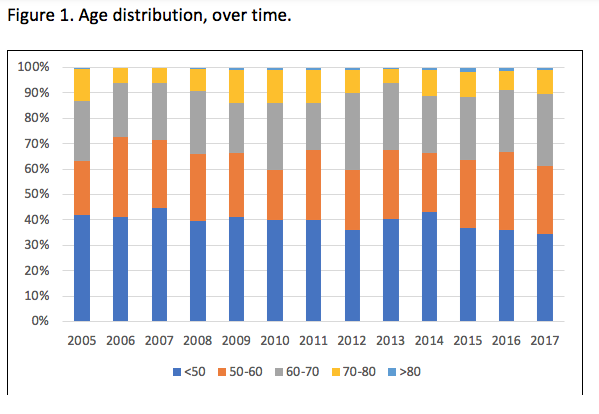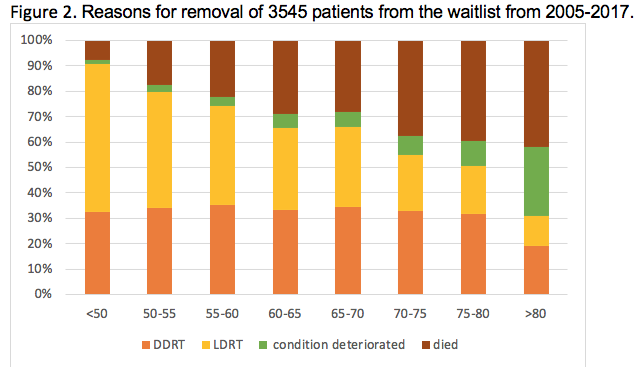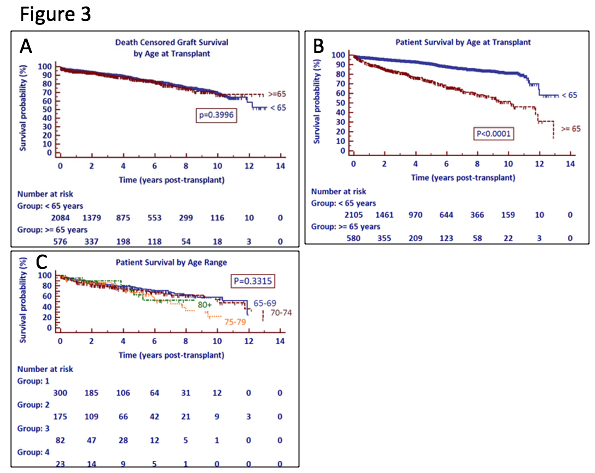Long-Term Outcomes of Older Kidney-Transplant Recipients: A Single-Center Experience
S. Sultan, M. Aull, M. Lubetzky, A. Watkins, S. Kapur
Weill Cornell Medical College, New York, NY
Meeting: 2019 American Transplant Congress
Abstract number: C211
Keywords: Age factors, Elderly patients, Kidney transplantation, Outcome
Session Information
Session Name: Poster Session C: Kidney: Cardiovascular and Metabolic
Session Type: Poster Session
Date: Monday, June 3, 2019
Session Time: 6:00pm-7:00pm
 Presentation Time: 6:00pm-7:00pm
Presentation Time: 6:00pm-7:00pm
Location: Hall C & D
*Purpose: Given the aging population of patients with ESRD, and the high rates of associated mortality, at our center we perform an individualized risk assessment prior to transplant, in which recipient age is only a portion of the overall analysis, which has been our practice since 2005. As such, we sought to evaluate our long-term experience with elderly kidney transplant recipients.
*Methods: We performed a retrospective review of all kidney transplant recipients at our institution between 2005 and 2017, and recipients were subdivided based on age at transplant. We also analyzed our waiting list, using UNOS records.
*Results: Of a total 2695 recipients, there were 580 over the age of 65, with progressively fewer elderly patients (figure 1). Figure 1 demonstrates the stability of the age distribution over time. Overall 56.0% underwent a living donor transplant, but the elderly were less likely to have a living donor (figure 2). Figure 2 shows that the elderly had higher removal rates due to death and deterioration. Overall mean follow-up time was 3.8 years (range 0.5 – 13.2), which did not vary significantly by age category. Figure 3a shows that the elderly had similar death-censored graft survival. Although the elderly had lower patient survival (figure 3b), a sub-group analysis showed comparable survival among the various subgroups of elderly patients (figure 3c).
*Conclusions: In a carefully selected group of elderly kidney-transplant recipients at a single-center, outcomes of both graft- and patient-survival were good, even in the face of fewer living-donors. The risks and benefits of kidney transplants in elderly recipients must be weighed carefully, considering the individualized characteristics of both the patient and the center, recognizing the high rates of mortality on the waitlist.
To cite this abstract in AMA style:
Sultan S, Aull M, Lubetzky M, Watkins A, Kapur S. Long-Term Outcomes of Older Kidney-Transplant Recipients: A Single-Center Experience [abstract]. Am J Transplant. 2019; 19 (suppl 3). https://atcmeetingabstracts.com/abstract/long-term-outcomes-of-older-kidney-transplant-recipients-a-single-center-experience/. Accessed March 2, 2026.« Back to 2019 American Transplant Congress



